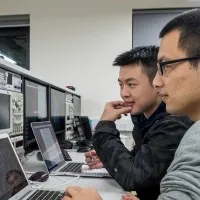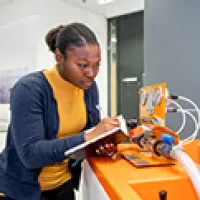About this course
Master a wide range of modern approaches to artificial intelligence (AI) and machine learning. You’ll learn to design and develop the next generation of systems and services, and graduate with a skillset that is both in demand and growing.
AI is one of the fastest developing areas of computer science and is quickly becoming essential in automating processes across nearly all domains of modern life.
Techniques involving big data and machine learning are driving efficiency and performance, rapidly transforming the ways we live and work.
On this artificial intelligence program you’ll have the opportunity to:
- explore natural intelligence using computer models and learn to build systems capable of intelligent decisions and actions
- explore core AI technologies and techniques, including high level programming, data analytics, deep learning and computer vision
- use our modern lab facilities as you undertake practical, research-led learning
- tailor your course to your interests by specialising in a range of optional topics
- undertake a group design project in your final year
This masters degree in artificial intelligence is also available with a foundation year.
Year in industry
Enhance your employability by taking this course with a paid industrial studies placement year.
Apply using:
- Course name: Artificial Intelligence with Industrial Studies
- UCAS code: I402
You’ll have the opportunity to:
- undertake a 1-year placement at a recognised partner company, further boosting your employment prospects
- explore natural intelligence using computer models and learn to build systems capable of intelligent decisions and actions
- explore core AI technologies and techniques, including high level programming, data analytics, deep learning and computer vision
- use our modern lab facilities as you undertake practical, research-led learning
- tailor your course to your interests by specialising in a range of optional topics
- undertake a group design project in your final year
As a graduate in Artificial Intelligence, you’ll be ideally placed to meet the demand for numerate and skilled scientists and engineers in the field.
Our 1-year placement is a great way to show that you can relate your academic skills and knowledge to contemporary industrial practice. It’s also a means of connecting you with future employers and adding value to your CV.
We regularly review our courses to ensure and improve quality. This course may be revised as a result of this. Any revision will be balanced against the requirement that the student should receive the educational service expected. Find out why, when, and how we might make changes.
Our courses are regulated in England by the Office for Students (OfS).
Learn more about these subject areas
Course location
This course is based at Highfield.
Awarding body
This qualification is awarded by the University of Southampton.
Entry requirements
For Academic year 202425
A-levels
A*AA including mathematics (minimum grade A).
A-levels additional information
A pass in the science Practical is required where it is separately endorsed.
Offers typically exclude General Studies and Critical Thinking.
Applicants who have not studied mathematics at A-level can apply for the Engineering/Physics/Mathematics Foundation Year
A-levels with Extended Project Qualification
If you are taking an EPQ in addition to 3 A levels, you will receive the following offer in addition to the standard A level offer: AAA including mathematics (minimum grade A), plus grade A in the EPQ
A-levels contextual offer
We are committed to ensuring that all applicants with the potential to succeed, regardless of their background, are encouraged to apply to study with us. The additional information gained through contextual data allows us to recognise an applicant's potential to succeed in the context of their background and experience. Applicants who are highlighted in this way will be made an offer which is lower than the typical offer for that programme, as follows: AAA including mathematics (minimum grade A)
International Baccalaureate Diploma
Pass, with 38 points overall, with 19 points required at Higher Level including 6 at Higher Level in Mathematics (Analysis and Approaches) or 7 at Higher Level in Mathematics (Applications and Interpretation)
International Baccalaureate Diploma additional information
Applicants who have not studied the required subjects at Higher Level can apply for the Engineering/Physics/Mathematics Foundation Year
International Baccalaureate contextual offer
We are committed to ensuring that all learners with the potential to succeed, regardless of their background, are encouraged to apply to study with us. The additional information gained through contextual data allows us to recognise a learner’s potential to succeed in the context of their background and experience. Applicants who are highlighted in this way will be made an offer which is lower than the typical offer for that programme.
International Baccalaureate Career Programme (IBCP) statement
Offers will be made on the individual Diploma Course subject(s) and the career-related study qualification. The CP core will not form part of the offer. Where there is a subject pre-requisite(s), applicants will be required to study the subject(s) at Higher Level in the Diploma course subject and/or take a specified unit in the career-related study qualification. Applicants may also be asked to achieve a specific grade in those elements. Please see the University of Southampton International Baccalaureate Career-Related Programme (IBCP) Statement for further information. Applicants are advised to contact their Faculty Admissions Office for more information.
BTEC
D in the BTEC National Extended Certificate plus grades A*A from two A-levels including mathematics (minimum grade A) or D* in the BTEC National Extended Certificate plus grades AA from two A-levels including mathematics.
D*D in the BTEC National Diploma plus grade A in A-level mathematics or DD in the BTEC National Diploma plus grade A* in A-level mathematics.
We will consider the BTEC National Extended Diploma if studied alongside A-level mathematics.
RQF BTEC
We are committed to ensuring that all learners with the potential to succeed, regardless of their background, are encouraged to apply to study with us. The additional information gained through contextual data allows us to recognise a learner’s potential to succeed in the context of their background and experience. Applicants who are highlighted in this way will be made an offer which is lower than the typical offer for that programme.
Additional information
Offers typically exclude General Studies and Critical Thinking. A pass in the science Practical is required where it is separately endorsed. Applicants who have not studied mathematics at A-level can apply for the Engineering/Physics/Mathematics Foundation Year
QCF BTEC
D in the BTEC Subsidiary Diploma plus grades A*A from two A-levels including mathematics (minimum grade A) or D* in the BTEC Subsidiary Diploma plus grades AA from 2 A-levels including mathematics.
D*D in the BTEC Diploma plus grade A in A-level mathematics or DD in the BTEC Diploma plus grade A* in A-level mathematics.
We will consider the BTEC Extended Diploma if studied alongside A-level mathematics.
We are committed to ensuring that all learners with the potential to succeed, regardless of their background, are encouraged to apply to study with us. The additional information gained through contextual data allows us to recognise a learner’s potential to succeed in the context of their background and experience. Applicants who are highlighted in this way will be made an offer which is lower than the typical offer for that programme.
Access to HE Diploma
Not accepted for this course. Applicants with an Access to HE Diploma in a relevant subject should apply for the Engineering/Physics/Mathematics Foundation Year
Irish Leaving Certificate
Irish Leaving Certificate (first awarded 2017)
H1 H1 H1 H2 H2 H2, to include mathematics and applied mathematics
Irish Leaving Certificate (first awarded 2016)
A1 A1 A1 A2 A2 A2 including mathematics and applied mathematics
Irish certificate additional information
Applicants who have not studied the required subjects can apply for the Engineering/Physics/Mathematics Foundation Year
Scottish Qualification
Offers will be based on exams being taken at the end of S6. Subjects taken and qualifications achieved in S5 will be reviewed. Careful consideration will be given to an individual’s academic achievement, taking in to account the context and circumstances of their pre-university education.
Please see the University of Southampton’s Curriculum for Excellence Scotland Statement (PDF) for further information. Applicants are advised to contact their Faculty Admissions Office for more information.
Cambridge Pre-U
D2, D3, D3 in three Principal subjects including mathematics
Cambridge Pre-U additional information
Cambridge Pre-U's can be used in combination with other qualifications such as A levels to achieve the equivalent of the typical offer, where D2 can be used in lieu of A-level grade A* or grade D3 can be used in lieu of A-level grade A. Applicants who have not studied the required Principal subjects can apply for the Engineering/Physics/Mathematics Foundation Year
Welsh Baccalaureate
A*AA including mathematics (minimum grade A) or A*A from two A-levels including mathematics (minimum grade A), and A from the Advanced Welsh Baccalaureate Skills Challenge Certificate.
Welsh Baccalaureate additional information
A pass in the science Practical is required where it is separately endorsed. Offers typically exclude General Studies and Critical Thinking. Applicants who have not studied the required subjects can apply for the Engineering/Physics/Mathematics Foundation Year
Welsh Baccalaureate contextual offer
We are committed to ensuring that all applicants with the potential to succeed, regardless of their background, are encouraged to apply to study with us. The additional information gained through contextual data allows us to recognise an applicant's potential to succeed in the context of their background and experience. Applicants who are highlighted in this way will be made an offer which is lower than the typical offer for that programme.
T-Level
A Distinction* overall, with A* in Core and Distinction in the Occupational Specialism, and grade A in A-level Mathematics.
The following T levels are accepted:
- Digital Business Services
- Digital Support Services
- Science
- Design and Development for Engineering and Manufacturing
- Maintenance, Installation and Repair for Engineering and Manufacturing
The following Occupational Specialisms are required:
- For the T level in Design and Development for Engineering and Manufacturing: either "Electrical and electronic engineering” or "Control and instrumentation engineering".
- For the T level in Maintenance, Installation and Repair for Engineering and Manufacturing: either "Maintenance engineering technologies: Electrical and Electronic" or "Maintenance engineering technologies: Mechatronic" or "Maintenance engineering technologies: Control and Instrumentation" or "Light and Electric Vehicles".
Other requirements
GCSE requirements
Applicants must hold GCSE English language (or GCSE English) (minimum grade 4/C) and mathematics (minimum grade 4/C)
Find the equivalent international qualifications for our entry requirements.
English language requirements
If English isn't your first language, you'll need to complete an International English Language Testing System (IELTS) to demonstrate your competence in English. You'll need all of the following scores as a minimum:
IELTS score requirements
- overall score
- 6.5
- reading
- 6.0
- writing
- 6.0
- speaking
- 6.0
- listening
- 6.0
We accept other English language tests. Find out which English language tests we accept.
You might meet our criteria in other ways if you do not have the qualifications we need. Find out more about:
- our Access to Southampton scheme for students living permanently in the UK (including residential summer school, application support and scholarship)
- skills you might have gained through work or other life experiences (otherwise known as recognition of prior learning)
Find out more about our Admissions Policy.
For Academic year 202526
A-levels
A*AA including mathematics (minimum grade A).
A-levels additional information
A pass in the science Practical is required where it is separately endorsed.
Offers typically exclude General Studies and Critical Thinking.
Applicants who have not studied mathematics at A-level can apply for the Engineering/Physics/Mathematics Foundation Year
A-levels with Extended Project Qualification
If you are taking an EPQ in addition to 3 A levels, you will receive the following offer in addition to the standard A level offer: AAA including mathematics (minimum grade A), plus grade A in the EPQ
A-levels contextual offer
We are committed to ensuring that all learners with the potential to succeed, regardless of their background, are encouraged to apply to study with us. The additional information gained through contextual data allows us to recognise a learner’s potential to succeed in the context of their background and experience. Applicants who are highlighted in this way will be made an offer which is lower than the typical offer for that programme.
International Baccalaureate Diploma
Pass, with 38 points overall, with 19 points required at Higher Level including 6 at Higher Level in Mathematics (Analysis and Approaches) or 7 at Higher Level in Mathematics (Applications and Interpretation)
International Baccalaureate Diploma additional information
Applicants who have not studied the required subjects at Higher Level can apply for the Engineering/Physics/Mathematics Foundation Year
International Baccalaureate contextual offer
We are committed to ensuring that all learners with the potential to succeed, regardless of their background, are encouraged to apply to study with us. The additional information gained through contextual data allows us to recognise a learner’s potential to succeed in the context of their background and experience. Applicants who are highlighted in this way will be made an offer which is lower than the typical offer for that programme.
International Baccalaureate Career Programme (IBCP) statement
Offers will be made on the individual Diploma Course subject(s) and the career-related study qualification. The CP core will not form part of the offer. Where there is a subject pre-requisite(s), applicants will be required to study the subject(s) at Higher Level in the Diploma course subject and/or take a specified unit in the career-related study qualification. Applicants may also be asked to achieve a specific grade in those elements. Please see the University of Southampton International Baccalaureate Career-Related Programme (IBCP) Statement for further information. Applicants are advised to contact their Faculty Admissions Office for more information.
BTEC
D in the BTEC National Extended Certificate plus grades A*A from two A-levels including mathematics (minimum grade A) or D* in the BTEC National Extended Certificate plus grades AA from two A-levels including mathematics.
D*D in the BTEC National Diploma plus grade A in A-level mathematics or DD in the BTEC National Diploma plus grade A* in A-level mathematics.
We will consider the BTEC National Extended Diploma if studied alongside A-level mathematics.
RQF BTEC
We are committed to ensuring that all learners with the potential to succeed, regardless of their background, are encouraged to apply to study with us. The additional information gained through contextual data allows us to recognise a learner’s potential to succeed in the context of their background and experience. Applicants who are highlighted in this way will be made an offer which is lower than the typical offer for that programme.
Additional information
Offers typically exclude General Studies and Critical Thinking. A pass in the science Practical is required where it is separately endorsed. Applicants who have not studied mathematics at A-level can apply for the Engineering/Physics/Mathematics Foundation Year
QCF BTEC
D in the BTEC Subsidiary Diploma plus grades A*A from two A-levels including mathematics (minimum grade A) or D* in the BTEC Subsidiary Diploma plus grades AA from 2 A-levels including mathematics.
D*D in the BTEC Diploma plus grade A in A-level mathematics or DD in the BTEC Diploma plus grade A* in A-level mathematics.
We will consider the BTEC Extended Diploma if studied alongside A-level mathematics.
We are committed to ensuring that all learners with the potential to succeed, regardless of their background, are encouraged to apply to study with us. The additional information gained through contextual data allows us to recognise a learner’s potential to succeed in the context of their background and experience. Applicants who are highlighted in this way will be made an offer which is lower than the typical offer for that programme.
Access to HE Diploma
Not accepted for this course. Applicants with an Access to HE Diploma in a relevant subject should apply for the Engineering/Physics/Mathematics Foundation Year
Irish Leaving Certificate
Irish Leaving Certificate (first awarded 2017)
H1 H1 H1 H2 H2 H2, to include mathematics and applied mathematics
Irish Leaving Certificate (first awarded 2016)
A1 A1 A1 A2 A2 A2 including mathematics and applied mathematics
Irish certificate additional information
Applicants who have not studied the required subjects can apply for the Engineering/Physics/Mathematics Foundation Year
Scottish Qualification
Offers will be based on exams being taken at the end of S6. Subjects taken and qualifications achieved in S5 will be reviewed. Careful consideration will be given to an individual’s academic achievement, taking in to account the context and circumstances of their pre-university education.
Please see the University of Southampton’s Curriculum for Excellence Scotland Statement (PDF) for further information. Applicants are advised to contact their Faculty Admissions Office for more information.
Cambridge Pre-U
D2, D3, D3 in three Principal subjects including mathematics
Cambridge Pre-U additional information
Cambridge Pre-U's can be used in combination with other qualifications such as A levels to achieve the equivalent of the typical offer, where D2 can be used in lieu of A-level grade A* or grade D3 can be used in lieu of A-level grade A. Applicants who have not studied the required Principal subjects can apply for the Engineering/Physics/Mathematics Foundation Year
Welsh Baccalaureate
A*AA including mathematics (minimum grade A) or A*A from two A-levels including mathematics (minimum grade A), and A from the Advanced Welsh Baccalaureate Skills Challenge Certificate.
Welsh Baccalaureate additional information
A pass in the science Practical is required where it is separately endorsed. Offers typically exclude General Studies and Critical Thinking. Applicants who have not studied the required subjects can apply for the Engineering/Physics/Mathematics Foundation Year
Welsh Baccalaureate contextual offer
We are committed to ensuring that all applicants with the potential to succeed, regardless of their background, are encouraged to apply to study with us. The additional information gained through contextual data allows us to recognise an applicant's potential to succeed in the context of their background and experience. Applicants who are highlighted in this way will be made an offer which is lower than the typical offer for that programme.
T-Level
A Distinction* overall, with A* in Core and Distinction in the Occupational Specialism, and grade A in A-level Mathematics.
The following T levels are accepted:
- Digital Business Services
- Digital Support Services
- Science
- Design and Development for Engineering and Manufacturing
- Maintenance, Installation and Repair for Engineering and Manufacturing
The following Occupational Specialisms are required:
- For the T level in Design and Development for Engineering and Manufacturing: either "Electrical and electronic engineering” or "Control and instrumentation engineering".
- For the T level in Maintenance, Installation and Repair for Engineering and Manufacturing: either "Maintenance engineering technologies: Electrical and Electronic" or "Maintenance engineering technologies: Mechatronic" or "Maintenance engineering technologies: Control and Instrumentation" or "Light and Electric Vehicles".
Other requirements
GCSE requirements
Applicants must hold GCSE English language (or GCSE English) (minimum grade 4/C) and mathematics (minimum grade 4/C)
Find the equivalent international qualifications for our entry requirements.
English language requirements
If English isn't your first language, you'll need to complete an International English Language Testing System (IELTS) to demonstrate your competence in English. You'll need all of the following scores as a minimum:
IELTS score requirements
- overall score
- 6.5
- reading
- 6.0
- writing
- 6.0
- speaking
- 6.0
- listening
- 6.0
We accept other English language tests. Find out which English language tests we accept.
You might meet our criteria in other ways if you do not have the qualifications we need. Find out more about:
- our Access to Southampton scheme for students living permanently in the UK (including residential summer school, application support and scholarship)
- skills you might have gained through work or other life experiences (otherwise known as recognition of prior learning)
Find out more about our Admissions Policy.
Got a question?
Please contact our enquiries team if you're not sure that you have the right experience or qualifications to get onto this course.
Email: enquiries@southampton.ac.uk
Tel: +44(0)23 8059 5000
Course structure
This is a 4-year course with the opportunity to specialise with optional modules in years 3 and 4. Your learning will be led by the latest research, with modules specialising in core skills required for all AI, machine language and data scientists and engineers.
Year 1 overview
You’ll be introduced to the basic principles of mathematics and programming for AI and computer engineering. You’ll also explore topics like:
- data analytics
- the ethics and security of computing
- algorithms and analysis
Together, these core concepts will form the foundations for more in-depth study.
Year 2 overview
You’ll build on year 1, exploring topics like:
- AI and learning machines
- scientific computing
- signals and analysis
You’ll also undertake an interdisciplinary group project, giving you the chance to work with a wide audience of engineers, scientists and other domain experts.
Year 3 overview
You’ll have the opportunity to specialise, with optional modules exploring topics like:
- computational biology
- natural language processing
- computer vision
- causal reasoning and machine learning
You’ll also undertake your individual project. This will be your opportunity to acquire valuable skills in teamwork, project planning, time management and presentation. You’ll apply your learning to design and build problems, and gain experience working to a brief.
Year 4 overview
You’ll undertake a group design project, and specialise further in areas like:
- algorithmic game theory
- biometrics
- data visualisation
- social media and network science
- simulation modelling
Want more detail? See all the modules in the course.
Modules
The modules outlined provide examples of what you can expect to learn on this degree course based on recent academic teaching. As a research-led University, we undertake a continuous review of our course to ensure quality enhancement and to manage our resources. The precise modules available to you in future years may vary depending on staff availability and research interests, new topics of study, timetabling and student demand. Find out why, when and how we might make changes.
Year 1 modules
You must study the following modules in year 1:
AICE Lab Programme Year 1
This module is the lab programme for all first-year students enrolled on an AICE degree programme. A range of lab activities which tie into each of the first year modules are provided. It aims to give students the opportunity to apply the theory that they...
Algorithms and Analysis
Algorithms and Analytics provides an introduction to core data structures and algorithms as well as the analytical tools to understand their performance. It covers the usage of algorithms for problem solving, their implementations in different programmin...
Data Analytics
Working with data of various forms is a crucial skill for all engineers and scientists. This module introduces students to working with, analysing and processing various different forms of data. The module focusses on ensuring students have a thorough gra...
Digital Computer Systems
Ethics and Security of Computing
High-Level Programming
Low-Level Programming
Mathematics for Artificial Intelligence and Computer Engineering (I)
This module provides students with some fundamental mathematical concepts relevant to applications in AI and CE. The focus will be on applying mathematical proofs to solve computer science problems as well as introducing basic concepts and techniques in l...
Mathematics for Artificial Intelligence and Computer Engineering (II)
This module provides students with fundamental mathematical concepts relevant to applications in AI and CE. The focus will be on probability, statistical inference, combinatorics, optimization techniques, calculus – partial derivatives and ordinary differ...
Year 2 modules
You must study the following modules in year 2:
AI and CE Interdisciplinary Group Project
Artificial Intelligence and Learning Machines
This module introduces the fundamental concepts of artificial intelligence. The content is intentionally broad, covering the history of AI from computational, representational and philosophical aspects. The module looks at artificial intelligence through ...
Code Transformation
Machine Learning (I)
Machine Learning is about extracting useful information from large and complex datasets. The subject is a rich mixture of concepts from function analysis, statistical modelling and computational techniques. The module will introduce the fundamental princi...
Parallel and Distributed Computing
Scientific Computing
Scientific computing is concerned with numerical representations and algorithms for solving problems that can be implemented as computer programs. This module gives an overview of the field of scientific and numerical computing. The module covers the most...
Signals and Analysis
The module provides the students with a theoretical and practical understanding of signals, including concepts of sampling, filtering, information theory, uncertainty and data compression. Practical aspects of these topics will also be covered using data...
Systematic Design
Year 3 modules
You must study the following modules in year 3:
Machine Learning (II)
Machine Learning is about extracting useful information from large and complex datasets. Building upon the Machine Learning (I) module, students will learn about a broader range of learning tasks. There will be significant exposure to solving real-world ...
Part III Individual Project Phase 1
The Part Three Individual Project gives students the opportunity to gain both detailed knowledge and practical experience in a more focussed area than generally possible elsewhere in their degree programme. Most projects are in the nature of a challenging...
Part III Individual Project Phase 2
The Part III Individual Project gives students the opportunity to gain both detailed knowledge and practical experience in a more focussed area than generally possible elsewhere in their degree programme. Most projects are in the nature of a challenging e...
You must also choose from the following modules in year 3:
Advanced Computer Networks
This module is designed to be a follow-up module to the computer Science or ITO second year introductory networking module. The wireless networking part reviews wireless technologies and their application in areas such as IoT and sensor networks. The mod...
Advanced Databases
This module builds on the first year Data Management module to give students a deeper and broader view of the issues involved in database management systems, some of the most complex software in common use.
Causal Reasoning and Machine Learning
Computational Biology
Modern biology poses many challenging problems for the computer scientists. Rapid growth in instrumentation, and our ability to archive and distribute vast amounts of data, has significantly changed the way we attempt to understand cellular function, and ...
Computer Vision
The challenge of computer vision is to develop a computer based system with the capabilities of the human eye-brain system. It is therefore primarily concerned with the problem of capturing and making sense of digital images. The field draws heavily on ma...
From Data to Dynamical Model: System Identification
The main problem in system identification is deriving mathematical models of dynamical systems (for transfer function, state-space) from data. Such problem arises for example in control, when the complexity of a model or lack of physical insight prevent t...
Green Electronics
This module covers recent developments in electronic devices that reduce energy consumption, generate power, or advance the distribution of power. Together these devices are playing an essential role in reducing our dependence on fossil fuels. The modu...
High Performance Computing
Natural Language Processing
This module gives students an introduction to natural language processing (NLP) algorithms and an understanding of how to implement NLP applications.
Parallel Programming
Real-Time Computing and Embedded Systems
This module gives a broad introduction to development of real-time and embedded systems
Robotic Systems
Robots are becoming more widely used in society, with applications ranging from agriculture through to manufacturing, with increasing interest in autonomous systems. This module will introduce students to the fundamentals of robotic systems including k...
Security of Cyber Physical Systems
The course requires to understand C code, assembly language, x86 architectures and memory allocation (a refresher will be provided).
Year 4 modules
You must study the following modules in year 4:
Group Design Project
This module provides an introduction to intensive group project work in collaboration with an industrial or academic customer. Students work in groups of at least four people on a project typically based on an idea from an industrial partner, or from an a...
Industrial Studies
This Industrial Studies module is part of our MEng programmes with “Industrial Studies” in the title, and allows students to go on to a one-year placement in industry in Part III of their programme. Students are normally expected start their placement...
You must also choose from the following modules in year 4:
Advanced Machine Learning
- To introduce key concepts in pattern recognition and machine learning; including specific algorithms for classification, regression, clustering and probabilistic modeling. - To give a broad view of the general issues arising in the application of algor...
Algorithmic Game Theory
This module: - Introduces the students to the key issues of interaction of multiple self-interested parties (a.k.a. agents) and gives a broad survey of topics at the interface of theoretical computer science and game theory dealing with such interactions...
Automated Software Verification
This module aims to train students in both the principles and the practice of software verification. A range of verification approaches, including both testing and formal verification, will be covered. The use of logic as a specification language for prog...
Bayesian, Active & Reinforcement Learning
Biologically Inspired Robotics
This module lies at the intersection of robotics and biology. Through the abstraction of design principles from biological systems, it is possible to develop a range of core competences, including mechatronic systems, sensor and actuator technologies. By ...
Biometrics
Biometrics is about how we can recognise people automatically, by personal characteristic. We all have fingerprints and faces - and they are unique. We have to sense the information, process it and then deliver an assessment of the identity associated wit...
Computational Finance
Financial markets form the source of a vast number of challenging computational problems. These are not only intellectually challenging from the point of view of computational modelling, but the financial sector is also an employer of a significant fracti...
Cryptography
This module covers the mathematics, techniques, and applications of modern cryptography. We will look at the history of code making and code breaking, and draw lessons for the future from the mistakes and successes of the past. We will also give a gentle ...
Data Mining
The challenge of data mining is to transform raw data into useful information and actionable knowledge. Data mining is the computational process of discovering patterns in data sets involving methods at the intersection of artificial intelligence, machine...
Data Visualisation
Welcome to the Data Visualisation module! In this course, you would learn about the terminology, concepts and techniques behind visualising data, and will get to use a range of tools to get experience of creating visual representations of data. You will g...
Differentiable Programming and Deep Learning
Deep learning and differentiable programming has revolutionised numerous fields in recent years. We've witnessed improvements in everything from computer vision through speech analysis to natural language processing as a result of the advent of cheap GPGP...
Evolution of Complexity
Evolution by natural selection has created amazingly complex and sophisticated solutions to some very difficult problems - how exactly does it achieve this, and how can we harness this capability for engineering artificial systems and computational proble...
Individual Research Project
The Individual Research Project is a 7.5 ECTS credit masters level module undertaken by independent study that allows students to demonstrate mastery of an advanced aspect of their discipline, including critical evaluation of current research and research...
Intelligent Agents
This module gives a broad introduction to the new and rapidly expanding field of agent-based computing. It introduces the key concepts and models of the field, dealing both with the individual agents and with their interactions. Particular emphasis is pla...
Knowledge Graphs for AI Systems
The last decade and a half have seen the Web move away from a purely document-centric information system to one in which hypertext techniques are applied to the sort of data found in databases; the term “Semantic Web” is used to refer to this Web of linke...
Machine Learning for Wireless Communications
The aim of the module is to introduce students to the fundamentals of machine learning and then to apply the advanced machine learning principles for the design and optimisation of wireless communications systems and mobile networks. Recently, the rese...
Optimisation for Machine Learning
This module is about the fundamentals of algorithms solving continuous optimisation problems, which involve minimising functions of multiple real-valued variables, possibly subject to restrictions, constraints, and nondifferentiable regularisations on the...
Probability in Computing
Computer Science has evolved significantly over the past decades, and various subfields require a strong foundation in probability. Such fondation is important in studying randomized algorithms, algorithm analysis, approximation algorithms and artificial ...
Simulation Modelling for Computer Science
Simulation modelling plays an increasingly significant role across modern science and engineering, with the development of computational models becoming established practice in industry, consulting, and policy formulation. Computer scientists are often em...
Social Media and Network Science
The second generation of web sites that came along in the mid 2000's included many of the social media sites that are now household names (YouTube, Flickr, Wikipedia, Facebook, Blogger, Twitter, etc.) These sites (known at the time as Web 2.0) focused on ...
Software Modelling Tools and Techniques for Critical Systems
This modules aims to provide practical skills in how to approach the modelling and design of a large critical software project. The module covers modelling techniques from requirements analysis to design and introduces a range of tools and approaches. In ...
Software Project Management and Secure Development
This module prepares students to develop an understanding of the critical issues and application of software project management. It introduces the students to the tools, techniques and body of knowledge involved in each stage of the project management lif...
Learning and assessment
The learning activities for this course include the following:
- lectures
- classes and tutorials
- coursework
- individual and group projects
- independent learning (studying on your own)
Academic support
You’ll be supported by a personal academic tutor and have access to a senior tutor.
Course leader
David Thomas is the course leader.
Careers
As the potential of AI as a technology has grown, so too have the career prospects. As a graduate in Artificial Intelligence, you’ll be ideally placed to meet the demand for numerate and skilled scientists and engineers in the field.
You could progress to work in roles like:
- AI Data Analyst
- Business Intelligence Developer
- Machine Learning Engineer
- Data Developer
- Data Scientist
A career in AI has wide applications across many sectors, whether it’s healthcare, education, sports, agriculture, construction, banking, marketing or E-commerce.
This degree also provides a firm foundation for further study at PhD level.
Careers services at Southampton
Fees, costs and funding
Tuition fees
Fees for a year's study:
- UK students pay £9,250.
- EU and international students pay £27,400.
Your fees will remain the same each year from when you start studying this course. This includes if you suspend and return.
What your fees pay for
Your tuition fees pay for the full cost of tuition and standard exams.
Find out how to:
Accommodation and living costs, such as travel and food, are not included in your tuition fees. There may also be extra costs for retake and professional exams.
Explore:
Bursaries, scholarships and other funding
If you're a UK or EU student and your household income is under £25,000 a year, you may be able to get a University of Southampton bursary to help with your living costs. Find out about bursaries and other funding we offer at Southampton.
If you're a care leaver or estranged from your parents, you may be able to get a specific bursary.
Get in touch for advice about student money matters.
Scholarships and grants
You may be able to get a scholarship or grant to help fund your studies.
We award scholarships and grants for travel, academic excellence, or to students from under-represented backgrounds.
Support during your course
The Student Services Centre offers support and advice on money to students. You may be able to access our Student Support fund and other sources of financial support during your course.
Funding for EU and international students
Find out about funding you could get as an international student.
How to apply
When you apply use:
- UCAS course code: I401
- UCAS institution code: S27
What happens after you apply?
We will assess your application on the strength of your:
- predicted grades
- academic achievements
- personal statement
- academic reference
We'll aim to process your application within 2 to 6 weeks, but this will depend on when it is submitted. Applications submitted in January, particularly near to the UCAS equal consideration deadline, might take substantially longer to be processed due to the high volume received at that time.
Equality and diversity
We treat and select everyone in line with our Equality and Diversity Statement.
Got a question?
Please contact our enquiries team if you're not sure that you have the right experience or qualifications to get onto this course.
Email: enquiries@southampton.ac.uk
Tel: +44(0)23 8059 5000
Related courses

Artificial Intelligence

Computer Engineering

Computer Engineering

Computer Science

Computer Science

Computer Science with Artificial Intelligence

Computer Science with Cyber Security

Creative Computing

Electronic Engineering with Computer Systems

Mathematics with Computer Science

Mechanical Engineering / Computational Engineering and Design

Software Engineering


